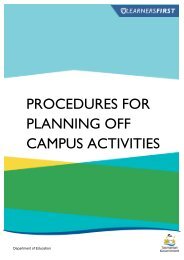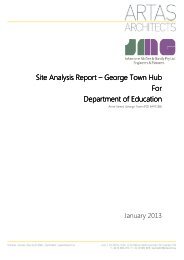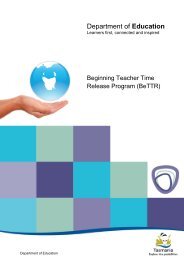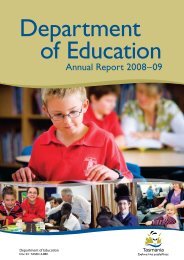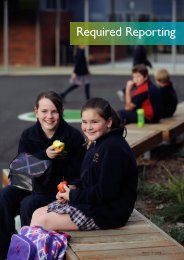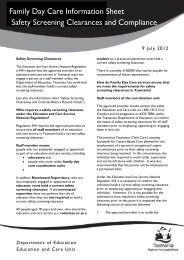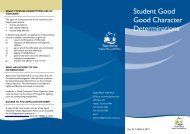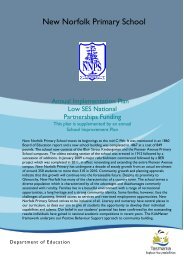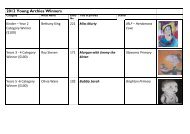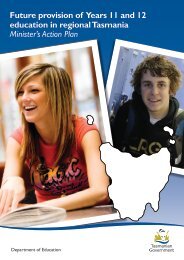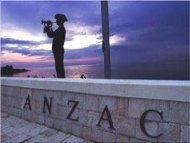Education
DoE Annual Report 2012-2013 - Department of Education
DoE Annual Report 2012-2013 - Department of Education
- No tags were found...
You also want an ePaper? Increase the reach of your titles
YUMPU automatically turns print PDFs into web optimized ePapers that Google loves.
Implementation of child and family centres<br />
Child and family centres (CFCs) provide a range of<br />
integrated services that support families with the health<br />
and wellbeing, learning and development of children<br />
from birth to school age, preparing them for a healthy life<br />
and success at school. The development and operation<br />
of CFCs includes support for children and families<br />
with disability.<br />
Nine state government funded CFCs are now operating,<br />
as of April 2013. A total of 10 centres are funded by the<br />
state government.<br />
The Tasmanian Planning Commission approved the<br />
development of the George Town Child and Family Centre<br />
as part of a HUB development on 26 July 2013.<br />
Submissions have now been prepared for the<br />
Parliamentary Standing Committee on Public Works<br />
for final approval.<br />
Two Indigenous CFCs at Bridgewater and Geeveston have<br />
been funded by the Commonwealth. The Aboriginal CFC<br />
that operates at Risdon Cove was supported by state<br />
government funding of $1 million for construction.<br />
Local Enabling Groups (LEGs) were formed to guide<br />
the service and development of each CFC. In some<br />
communities these are transitioning to advisory groups<br />
to support the ongoing development of the centres<br />
and implementation of integrated service delivery.<br />
Centre leaders and community inclusion workers are<br />
employed in all CFCs.<br />
Accessible facilities<br />
All building works and refurbishments are undertaken<br />
in accordance with Building Code of Australia and<br />
Disability Discrimination Act 1992 requirements. The<br />
department engaged a Professional Access Consultant to<br />
provide specialist advice on the design of the new child<br />
and family centres and substantial refurbishment works,<br />
in order to establish confidence that the new works comply<br />
with the standards.<br />
All facilities meet the appropriate standards in place at the<br />
time of construction. Retro-fitting occurs as facilities are<br />
reviewed to ensure all works remain fully compliant with<br />
current standards.<br />
Physical impairment coordinators work in conjunction<br />
with Facility Services to map the pathways for students<br />
with access issues and provision is made prior to the<br />
arrival of students where possible. Where higher level<br />
modifications are required for the needs of a specific<br />
individual these are also captured through the pathways<br />
mapping process.<br />
Where a student is relocated without notice to the<br />
department (from the mainland for example) temporary<br />
measures are put in place whilst permanent works are<br />
undertaken. The department has purchased a number<br />
of transportable ‘accessible bathroom pods’ that can be<br />
relocated from one school to another where unexpected<br />
circumstances arise and accessible bathroom facilities are<br />
required urgently.<br />
Required Reporting » Disability Framework for Action<br />
73



